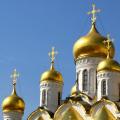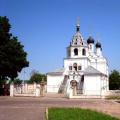Member of the All-Russian Party "United Russia".
Ambassador Extraordinary and Plenipotentiary of Russia to the United States since 2017.
Acting State Advisor of the Russian Federation, first class.
Anatoly Antonov was born on May 15, 1955 in the city of Omsk. After school in 1978 he graduated from the Faculty of International Economic Relations of the Moscow State Institute of International Relations. Further, he studied at the graduate school of the same university. Having received a diploma from the institute, he went to work at the USSR Ministry of Foreign Affairs. He held various positions in foreign missions and the central apparatus of the USSR Ministry of Foreign Affairs, then the Ministry of Foreign Affairs of the Russian Federation.
Since 2004, for seven years, Anatoly Ivanovich was the director of the department for security and disarmament issues of the Ministry of Foreign Affairs of the Russian Federation. He headed Russian delegations at international negotiations on various military-political issues, including conferences to review the Treaty on the Non-Proliferation of Nuclear Weapons, conventions on the prohibition of chemical and biological weapons, negotiations with the United States on further limitation of strategic offensive weapons and missile defense, and on multilateral mechanisms export controls.
Antonov repeatedly participated in the work of sessions of the General Assembly of the United Nations. Anatoly Ivanovich’s total work experience in the Ministry of Foreign Affairs of the Soviet Union and Russia is more than thirty years. He has the academic degrees of Doctor of Political Science and Candidate of Economic Sciences. In mid-July 2007, he received the diplomatic rank of Ambassador Extraordinary and Plenipotentiary.
By decree of Russian President Dmitry Medvedev on February 2, 2011, he was appointed Deputy Minister of Defense of the Russian Federation. In this position, he was responsible for the issues of international military and military-technical cooperation, including the preparation of international agreements in the relevant field. Oversaw the work of the Main Directorate for International Military Cooperation and the Directorate for Monitoring the Implementation of Treaties, and the National Center for Nuclear Risk Reduction. He was systematically involved in public comments on current military-political topics, and took part in specialized scientific and analytical conferences. Responsible for organizing contacts between the Russian Ministry of Defense and military departments of foreign countries.
At the end of January 2014, Antonov was awarded the class rank of Actual State Advisor of the Russian Federation, 1st class. In December 2016, Anatoly Ivanovich took the post of Deputy Minister of Foreign Affairs of the Russian Federation. At the Russian Foreign Ministry he was responsible for military-political issues.
By decree of Russian President Vladimir Putin on August 21, 2017, Anatoly Antonov was appointed Ambassador Extraordinary and Plenipotentiary of Russia to the United States of America and permanent observer of Russia at the Organization of American States in Washington. Presented his credentials to US President Donald Trump on September 8, 2017.
Married, has a daughter.
Biography
Anatoly Ivanovich Antonov is a Russian statesman and diplomat. Ambassador Extraordinary and Plenipotentiary of the Russian Federation to the United States of America since August 21, 2017.
In the past - Deputy Minister of Foreign Affairs of the Russian Federation from December 28, 2016 to August 21, 2017. Deputy Minister of Defense of the Russian Federation (2011-2016). Acting State Advisor of the Russian Federation, 1st class (2014). Ambassador Extraordinary and Plenipotentiary (2007). Doctor of Political Sciences.
Anatoly Ivanovich Antonov was born on May 15, 1955 in Omsk. In 1978 he graduated from the Faculty of International Economic Relations of MGIMO, in 1984 - graduate school at MGIMO.
In 1978 he joined the USSR Ministry of Foreign Affairs. He held various positions in foreign missions and the central apparatus of the USSR Ministry of Foreign Affairs, then in the Ministry of Foreign Affairs of the Russian Federation.
In 2004-2011 - Director of the Department for Security and Disarmament Issues of the Ministry of Foreign Affairs of the Russian Federation. Headed Russian delegations at international negotiations on various military-political issues, including conferences to review the Treaty on the Non-Proliferation of Nuclear Weapons, conventions on the prohibition of chemical and biological weapons, negotiations with the United States on further limitation of strategic offensive weapons and missile defense, and on multilateral mechanisms export controls. Repeatedly participated in the work of sessions of the UN General Assembly. Anatoly Antonov’s total work experience in the Ministry of Foreign Affairs of the Soviet Union and Russia is more than 30 years.
On February 2, 2011, by decree of the President of the Russian Federation, he was appointed Deputy Minister of Defense of the Russian Federation. At the ministry, he was responsible for the issues of international military and military-technical cooperation, including the preparation of international agreements in the relevant field. Oversaw the work of the Main Directorate for International Military Cooperation and the Directorate for Monitoring the Implementation of Treaties (National Center for Nuclear Risk Reduction). He was systematically involved in public comments on current military-political topics, and took part in specialized scientific and analytical conferences. Responsible for organizing contacts between the Russian Ministry of Defense and military departments of foreign countries.
In connection with the war in Ukraine and the entry of Crimea into Russia, in February 2015 he was included in the sanctions lists of the European Union and Canada, in September 2015 - in the sanctions list of Ukraine.
On December 18, 2016, by decree of the President of the Russian Federation, he was appointed Deputy Minister of Foreign Affairs of the Russian Federation. At the Russian Foreign Ministry he oversees military-political security issues.
After the presidential elections in the United States, the question arose about replacing the Russian Ambassador to the United States, who served in this position for eight years. Anatoly Antonov was named in the press as the most likely candidate for this position. On May 11, 2017, the Russian Ministry of Foreign Affairs submitted the candidacy of Anatoly Antonov to the Federal Assembly of the Russian Federation to consider appointment to the post of Ambassador Extraordinary and Plenipotentiary of the Russian Federation to the United States. The appointment was approved by the State Duma of the Federal Assembly of the Russian Federation and the Federation Council of the Federal Assembly of the Russian Federation.
On August 21, 2017, by decree of the President of Russia, he was appointed to the post of Ambassador of the Russian Federation to the United States. On August 31, he arrived in Washington, and on September 8, 2017, he presented his credentials to US President Donald Trump.
He has the academic degrees of Doctor of Political Science and Candidate of Economic Sciences.
Ambassador Extraordinary and Plenipotentiary (July 12, 2007).
Acting State Advisor of the Russian Federation, 1st class (January 27, 2014).
Awards
Order of Merit for the Fatherland, IV degree (2010)Order of Alexander Nevsky
Order of Military Merit
Order of Honor
Order of Honor (February 11, 2008) - for great contribution to the implementation of the foreign policy of the Russian Federation, many years of impeccable diplomatic service
TASS DOSSIER. On August 21, 2017, Russian President Vladimir Putin appointed Anatoly Antonov Ambassador Extraordinary and Plenipotentiary of Russia to the United States and permanent observer of Russia at the Organization of American States in Washington, concurrently.
By another decree, the Russian President relieved the former head of the Russian diplomatic mission in the United States, Sergei Kislyak, from his duties as ambassador.
In 1978 he graduated from the Moscow State Institute of International Relations of the USSR Ministry of Foreign Affairs (now MGIMO University of the Russian Foreign Ministry), in 1983 - graduate school at MGIMO.
Candidate of Economic Sciences, Doctor of Political Sciences. In 2012, he defended his dissertation at the Institute of World Economy and International Relations of the Russian Academy of Sciences on the topic “Nuclear arms control as a factor in ensuring national and international security.”
Since 1978 he worked in the system of the USSR Ministry of Foreign Affairs.
In 1995-1998, he served as Deputy Director of the Department for Security and Disarmament Issues of the Russian Ministry of Foreign Affairs.
From 1998 to 2002 - Deputy Permanent Representative of the Russian Federation to the UN office and other international organizations in Geneva (Switzerland).
In 2002-2004 - Ambassador at Large for the Ministry of Foreign Affairs. He was Russia's representative for the Global Partnership in the Group of Eight (G8). He was also the leader of a number of Russian government delegations, in particular, in 2003 at the Geneva meeting to monitor compliance with the Biological Weapons Convention and the annual meeting of the countries party to the 1980 Inhumane Weapons Convention.
From May 2004 to February 2011, he headed the Department for Security and Disarmament Affairs of the Ministry of Foreign Affairs. In June 2007, he headed the Russian delegation in Vienna (Austria) at an emergency conference of parties to the Treaty on Conventional Armed Forces in Europe (CFE), convened at the initiative of the Russian Federation. The Russian delegation submitted a package of proposals designed to equalize the military potentials of the Russian Federation and NATO. In particular, Russia demanded that the Baltic countries join the CFE Treaty, as well as a reduction in the overall level of weapons and equipment of NATO countries to compensate for the potential acquired as a result of the expansion of the bloc after 1991. It was not possible to agree on the final document, and in July 2007 Russia suspended its membership in the CFE Treaty.
In 2009, Antonov led the Russian delegation that participated in the development of the Strategic Arms Reduction Treaty (START-3). On April 8, 2010, the document was signed by the Presidents of the Russian Federation and the United States, Dmitry Medvedev and Barack Obama, in Prague.
Since February 2, 2011, Antonov has been Deputy Minister of Defense of the Russian Federation. During this period, the department was headed by Anatoly Serdyukov, and from November 6, 2012 - by Sergei Shoigu. Antonov became the seventh civilian deputy minister of war. He oversaw issues of international military cooperation and the organization of contacts between the Russian ministry and the military departments of foreign countries, coordinated the activities of the department for monitoring the implementation of treaties (National Center for Nuclear Risk Reduction). He held the position until December 28, 2016.
In 2011, as a deputy minister, he took part in Russian-American negotiations on the deployment of the US missile defense system in Europe. In April 2013, he participated in a meeting between Russian President Vladimir Putin and US Presidential Assistant for National Security Affairs Thomas Donilon. During it, in particular, issues related to the expansion of missile defense in Europe and the introduction of US sanctions against a number of Russian officials accused by the American side of involvement in the death of the auditor of the Hermitage Capital investment fund Sergei Magnitsky were discussed.
On behalf of Shoigu, Antonov held meetings with foreign military attaches, informing them about sudden combat readiness checks and exercises of the Russian Armed Forces. On April 15, 2014, he issued a statement by the Russian Ministry of Defense on the suspension of the transfer of weapons and military equipment from Crimea to Ukraine due to the fact that these weapons could be used against civilians in the east of the country.
On February 16, 2015, it was included in the sanctions list of the European Union (in connection with the reunification of Crimea with Russia), on February 17 - on a similar list in Canada, on March 6 - in Switzerland, and on September 16, 2015 - in Ukraine.
Since December 28, 2016 - Lavrov’s deputy, overseeing military-political security issues. Antonov became the tenth deputy head of the Russian Foreign Ministry: on the same day as his appointment, changes were made to the regulations of the department, increasing the number of deputy ministers. In January 2017, the media reported on the possible appointment of Antonov as the new head of the Russian diplomatic mission in the United States. On May 18, 2017, the State Duma Committee on International Affairs supported his candidacy for the post of ambassador.
Member of the Russian International Affairs Council.
The total amount of declared annual income for 2016 amounted to 11 million 421 thousand rubles.
Ambassador Extraordinary and Plenipotentiary (2007).
Acting State Advisor of the Russian Federation, 1st class (2014).
Awarded the Orders of "For Military Merit", Friendship, two Orders of Honor (2008), Alexander Nevsky, "For Services to the Fatherland" IV degree (2010). Awarded a Certificate of Honor from the Government of the Russian Federation (2004).
Speaks English and Burmese.
Anatoly Antonov, who previously served as Deputy Minister of Foreign Affairs, has been appointed as the new Russian Ambassador to the United States. In this post he will replace Sergei Kislyak. The decree was signed by Russian President Vladimir Putin. A diplomat with 30 years of experience, Antonov repeatedly took part in sessions of the UN General Assembly, dealt with issues of military-political security and disarmament, and participated in conferences on the non-proliferation of nuclear weapons and the prohibition of chemical and biological weapons. In the 2010s, as Deputy Minister of Defense, Antonov took a rather tough position regarding the policies of Washington and NATO. About the new face of Russian diplomacy in the United States - in the RT material.

- Reuters
Vladimir Putin signed a decree appointing a new Russian ambassador to the United States. He became Deputy Minister of Foreign Affairs of Russia Anatoly Antonov, who replaced Sergei Kislyak in this post. The advisory document was published on the Kremlin website.
“To appoint Anatoly Ivanovich Antonov as Ambassador Extraordinary and Plenipotentiary of the Russian Federation to the United States of America and permanent observer of the Russian Federation at the Organization of American States in Washington, concurrently,” the decree says.
Diplomatic work
The total work experience of Anatoly Antonov, who turned 62 on May 15, in the Ministry of Foreign Affairs of the Soviet Union and Russia is more than 30 years.
A native of Omsk began working at the USSR Ministry of Foreign Affairs immediately after graduating from the Faculty of International Economic Relations at MGIMO in 1978. Throughout his career, he held various positions both in the central office of the ministry and abroad.

- Russian President Dmitry Medvedev presents the Order of Merit for the Fatherland, 4th degree, to Anatoly Antonov, director of the Department for Security and Disarmament of the Russian Foreign Ministry.
- RIA News
An experienced diplomat, he repeatedly participated in the work of sessions of the UN General Assembly, and in July 2007 he was awarded the rank of Ambassador Extraordinary and Plenipotentiary.
The pinnacle of Antonov’s diplomatic activity was the post of Deputy Minister of Foreign Affairs of Russia, to which he was appointed in December 2016. At the same time, he mainly dealt with issues of military-political security and disarmament, participated in conferences on the non-proliferation of nuclear weapons and the prohibition of chemical and biological weapons.
Military activities
Antonov also managed to work in the military department. On February 2, 2011, by decree of the Russian President, he was appointed Deputy Minister of Defense of the Russian Federation. Now a military diplomat oversaw the work of the Main Directorate of International Military Cooperation and the Directorate for Monitoring the Implementation of Treaties. In addition, Antonov was responsible for organizing contacts between the Ministry of Defense and military departments of foreign countries.
During his time at the Ministry of Defense, he participated in the Russia-NATO Council, the Munich and Moscow Security Conferences, and the International Security Forums in Geneva and Beijing. At the end of December 2016, Antonov returned to the foreign policy department.

- RIA News
About relations with the USA
While serving as Deputy Minister of Defense, Antonov more than once made vivid reports and statements on the foreign policy situation in the world.
“Some associations, such as the European Union, take it upon themselves to determine who should behave how in the international arena.<...>States that express a different point of view are trying to punish according to their own laws, not recognized by the international community and the UN. This is what is happening today in relation to Russia. And the role of judges was taken by the USA, EU countries, Canada and a number of other states,” Antonov said on the eve of the IV Moscow Conference on International Security in 2015.
He has always maintained that NATO cannot be the only guarantor of freedom and democracy in the world, as is often said in Brussels. “So, happiness lies only in NATO membership? And all others, not members of the alliance, are second-class states?” - the Deputy Head of Defense of Russia asked reporters at one of the briefings.
In his opinion, relations between Moscow and Washington have recently deteriorated noticeably, and through the fault of the United States. “I think we clearly lack trust between states. Without trust, it will be difficult to repair the international security system, which has been seriously undermined by the actions of the United States and its allies in the international arena... In my entire diplomatic career, I don’t remember when Russian-American relations were so difficult,” he explained.
Antonov also stated that abroad they are now trying to make Russia into some kind of monster carrying out
Antonov is considered one of the most experienced Russian negotiators on nuclear issues. He worked for a long time in the Ministry of Foreign Affairs, moved to work under the minister and retained his position under.
“The culture of negotiations has been lost”
Issues of his competence included contacts with the military departments of foreign states. While working as director of the Department of Security and Disarmament Affairs of the Ministry of Foreign Affairs in 2004-2011, Antonov oversaw the negotiation process in the field of nuclear disarmament.
While working in the foreign policy department, Antonov led the Russian delegations at the negotiations on the Treaty on the Non-Proliferation of Nuclear Weapons and on the Prohibition of Chemical and Biological Weapons. He also led the delegation to the negotiations with the United States on the New START Treaty in 2010.
Antonov enjoyed great respect from his Western colleagues, although he had a reputation as a “tough negotiator”
says Victor, an expert in international security who worked with the diplomat.
“He made a tremendous contribution to the development of the New START Treaty, and now such a person will be very useful for the Foreign Ministry,” says Mizin.
The director of the Independent Institute for Strategic Assessments, who is familiar with Antonov, notes that Antonov’s appointment indicates that the position of the Russian side in anticipation of coming to the White House is changing to a more constructive one. At the same time, Oznobishchev notes that the Foreign Ministry currently needs experienced negotiators of Antonov’s level. “The history and practice of negotiations has been lost - young people have been brought up in recent years on completely different ideas,” he says.
The former head of the Russian Foreign Ministry recently stated that the experience of negotiation processes has been lost. “The culture of the negotiation process has been lost in Russia and the United States,” he said, speaking at a conference on nuclear safety as part of the International Luxembourg Forum on Preventing Nuclear Catastrophe.
Ivanov, who participated in many high-level negotiations as foreign minister, noted that there were very few people left in both the Russian and American foreign affairs agencies capable of conducting high-level negotiations on nuclear issues.
The Foreign Ministry explains that Antonov will not touch upon nuclear issues, but will deal with “general issues of military-political security.” This includes issues of interaction with military diplomats of other countries, work with organizations such as and.
Heritage
In the last years of his reign, the dialogue between Russia and the United States on nuclear issues was practically frozen. One of the main concerns is the fate of the Intermediate-Range Nuclear Forces Treaty (INF), signed in 1987 by the leader of the USSR and the President of the United States. The treaty, which led to the elimination of an entire class of missiles, is a “cornerstone” for international security.
Both sides accuse each other of violating it, and the issue is expected to become Barack Obama's "legacy" for the Donald Trump administration. As a leading expert in the field of international security previously stated in his article for, if the United States withdraws from the INF Treaty, other treaties, such as START III of 2010, and then the Triple-Area Nuclear Test Ban Treaty of 1963, may also crumble.
“This is an extremely important agreement, and its destruction would, in my opinion, be a disaster for both the West and Russia. Therefore, now there are discussions on mutual claims,” the chief researcher told Gazeta.Ru. According to the expert, all mutual claims between Russia and the United States can be removed “with normal relations within the framework of conciliation commissions.”
“We will wait until they are ready for commissions, but I believe that this is a completely unacceptable option - the destruction of this agreement,” he concluded.
While working at the Ministry of Defense, Antonov was actively involved in the problems of interaction with the United States on the issue of cooperation in Syria, however, despite the existence of a framework agreement between the Russian Ministry of Foreign Affairs and Russia, both sides were unable to implement it in practice. As a result, the joint fight against “” and IS (both organizations are banned in Russia. - Gazeta.Ru) never began.
In addition to the decree appointing Deputy Minister Antonov, Putin signed a decree allowing the department to have ten deputy ministers. There are currently nine deputy ministers in the Ministry of Foreign Affairs. If Russia decides to appoint a new ambassador to the United States after Trump’s inauguration, it could well be one of the current deputy ministers. Currently, the Russian Ambassador to the United States is, who at one time served as Deputy Head of the Russian Foreign Ministry.




